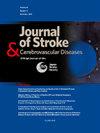Clinical features, hemorrhage risk and epilepsy outcomes of familial cerebral cavernous malformation: A 20-year observational pragmatic single-center study
IF 2
4区 医学
Q3 NEUROSCIENCES
Journal of Stroke & Cerebrovascular Diseases
Pub Date : 2024-09-25
DOI:10.1016/j.jstrokecerebrovasdis.2024.108041
引用次数: 0
Abstract
Introduction
Familial Cerebral Cavernous Malformations (fCCMs) are rare, hereditary conditions characterized by multiple central nervous system lesions. Despite their rarity, CCMs can cause significant clinical challenges when symptomatic, manifesting as seizure and symptomatic hemorrhage (CASH). Guidelines suggest neurosurgical intervention for symptomatic or previously symptomatic lesions, while conservative management is recommended for new-onset epilepsy. However, the natural history and optimal management remain unclear, necessitating further research.
Objective
This study aims to provide a comprehensive analysis of the clinical features, hemorrhage risk, and epilepsy outcomes in fCCM patients over an extended follow-up period, offering a more precise estimate of CASH and epilepsy rates in this population.
Methods
This retrospective longitudinal cohort study included fCCM patients enrolled from 2001 to May 2024. Data collected included demographic information, new neurological symptoms, symptomatic hemorrhages, seizures, and modified Rankin Scale (mRS) scores. Incidence rates of first symptomatic events and Kaplan-Meier survival curves were calculated, with logistic and Cox-proportional hazard regression models used to evaluate outcomes.
Results
A total of 47 patients were included in this study, with a mean age at diagnosis of 37.51 years. At diagnosis, 68 % were symptomatic, with 30 % having CASH and 36 % experiencing seizures without CASH. During a median follow-up of 126.0 months (interquartile range, 110.5 months), 17 % had a new CASH event, 20 % had seizures without CASH, and 60 % remained asymptomatic. The bleeding rate was 1.02 % per patient-year, with new focal neurological symptoms at 2.045 per 1000 patient-years and new CASH at 10.225 per 1000 patient-years. Most patients maintained minimal or no disability (mRS 0 or 1). Presenting with epilepsy at baseline significantly increased the odds of future seizures (OR 18.13, p = 0.001).
Conclusion
This study highlights the complex presentation and progression of fCCMs, emphasizing the necessity for long-term monitoring. Baseline epilepsy is a significant predictor of future seizures, underscoring the need for individualized management strategies. Future research with larger cohorts and standardized criteria is essential to refine the understanding and management of fCCMs.
家族性脑海绵状畸形的临床特征、出血风险和癫痫预后:一项为期20年的实用性单中心观察研究:家族性脑空洞畸形的临床结果:一项为期 20 年的观察性研究。
简介家族性脑空洞畸形(fCCMs)是一种罕见的遗传性疾病,以中枢神经系统多发病变为特征。尽管罕见,但当出现症状时,脑空洞畸形会给临床带来巨大挑战,表现为癫痫发作和症状性出血(CASH)。指南建议对有症状或曾有症状的病变进行神经外科干预,而对新发癫痫则建议采取保守治疗。然而,自然病史和最佳治疗方法仍不明确,需要进一步研究:本研究旨在对 fCCM 患者的临床特征、出血风险和癫痫预后进行长期随访的综合分析,从而对该人群的 CASH 和癫痫发病率做出更精确的估计:这项回顾性纵向队列研究纳入了 2001 年至 2024 年 5 月期间入组的 fCCM 患者。收集的数据包括人口统计学信息、新的神经系统症状、症状性出血、癫痫发作和改良Rankin量表(mRS)评分。计算了首次症状事件的发生率和卡普兰-梅耶生存曲线,并使用逻辑和考克斯比例危险回归模型来评估结果:本研究共纳入 47 名患者,诊断时的平均年龄为 37.51 岁。确诊时,68%的患者无症状,30%有CASH,36%有癫痫发作但无CASH。在 126.0 个月的中位随访期间(四分位间范围为 110.5 个月),17% 的患者出现了新的 CASH 事件,20% 的患者在没有 CASH 的情况下出现了癫痫发作,60% 的患者仍无症状。每名患者每年的出血率为 1.02%,每 1000 名患者每年新增局灶性神经症状 2.045 例,每 1000 名患者每年新增 CASH 10.225 例。大多数患者的残疾程度极低或没有残疾(mRS 0 或 1)。基线时出现癫痫会显著增加未来癫痫发作的几率(OR 18.13,P = 0.001):本研究强调了慢性阻塞性肺疾病的复杂表现和进展,强调了长期监测的必要性。基线癫痫是未来癫痫发作的重要预测因素,强调了个体化管理策略的必要性。未来的研究必须要有更大的群体和标准化的标准,才能更好地理解和管理 fCCMs。
本文章由计算机程序翻译,如有差异,请以英文原文为准。
求助全文
约1分钟内获得全文
求助全文
来源期刊

Journal of Stroke & Cerebrovascular Diseases
Medicine-Surgery
CiteScore
5.00
自引率
4.00%
发文量
583
审稿时长
62 days
期刊介绍:
The Journal of Stroke & Cerebrovascular Diseases publishes original papers on basic and clinical science related to the fields of stroke and cerebrovascular diseases. The Journal also features review articles, controversies, methods and technical notes, selected case reports and other original articles of special nature. Its editorial mission is to focus on prevention and repair of cerebrovascular disease. Clinical papers emphasize medical and surgical aspects of stroke, clinical trials and design, epidemiology, stroke care delivery systems and outcomes, imaging sciences and rehabilitation of stroke. The Journal will be of special interest to specialists involved in caring for patients with cerebrovascular disease, including neurologists, neurosurgeons and cardiologists.
 求助内容:
求助内容: 应助结果提醒方式:
应助结果提醒方式:


